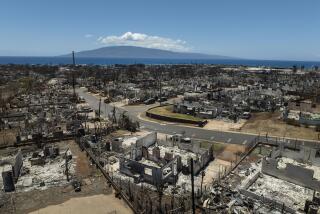Court Extends Hotel Aid for Evacuees to Feb. 7
WASHINGTON — Thousands of Hurricane Katrina victims who are living in hotel rooms got a reprieve when a federal judge ruled Monday that the Federal Emergency Management Agency could not go through with its plan to cut off payments in December or January and must extend the program until Feb. 7.
“FEMA’s actions in reference to its subsidy of hotels and motels has been notoriously erratic and numbingly insensitive,” U.S. District Judge Stanwood Duval of the Eastern District of Louisiana in Houma said in a blistering order issued Monday after hearing testimony from hurricane evacuees last week.
The decision, which will affect about 40,000 evacuees, was a rebuff for federal officials who -- after being criticized for the high cost of hotel housing -- sought to force individuals and families to take over responsibility for their own housing. And it was yet another blow for an agency that has continued to draw criticism for its response to the hurricane, both in the immediate aftermath of the August storm and in the months since.
Describing the way FEMA has changed the deadline three times since taking over the hotel program from the Red Cross in late October, Duval said, “It is unimaginable what anxiety and misery these erratic and bizarre vacillations by FEMA have caused these victims, all of whom, for at least one point in time, had the very real fear of being without shelter for Christmas.”
Lawyers for evacuees had argued that FEMA should not be permitted to end the hotel program before the agency had finished processing thousands of applications for temporary housing. FEMA has acknowledged that it couldn’t process all the applications by its own Jan. 6 deadline.
Ending the program under those conditions would leave thousands of evacuees homeless, the court said.
“This is the victory we prayed for,” said Howard Godnik of Schulte, Roth & Zabel, a New York law firm. “I’ve met these people -- we’ve been to the shelters, we’ve been to the tent cities -- these are people without hope. At least we’ve provided them some ray of hope in what otherwise has been a grim holiday season.”
About 85,000 applications for temporary housing are pending with FEMA, according to Godnik.
Duval said FEMA’s decision to end the program violated the federal statute governing emergency relief that forbids discrimination on grounds of economic status. The judge noted that many evacuees were living with friends and family, while others have been able to pay for replacement housing on their own, and that people in both groups have been receiving temporary housing assistance. He said that the plaintiffs “did not choose to live in hotel rooms.”
He also addressed the government lawyers’ argument that citizens “think of every problem in the United States as a federal problem and that the federal government is responsible for them.”
“While the court has no empirical evidence of this statement (or that it is true), certainly in this instance, by law and mandate, the federal government is responsible,” he wrote. “Underlying FEMA’s position is a theme that every person ultimately has to take care of him or herself. Certainly as a general rule this is true. But perhaps that position is unduly callous under the circumstances wrought by Hurricane Katrina.”
On Saturday, FEMA had announced that it would extend the Short-Term Lodging Program to Jan. 7 for all evacuees. Earlier, it had extended the deadline from Dec. 15 to Jan. 7 in the 10 states that house 92% of evacuees -- Alabama, Arkansas, California, Florida, Georgia, Louisiana, Mississippi, Nevada, Tennessee and Texas.
“The challenge of moving people from short-term to long-term housing is one that we take very seriously,” said FEMA spokeswoman Nicol Andrews. “As the Dec. 15 deadline approached, we are aware of folks whose eligible applications are still in process, and obviously, we are not going to be putting anyone out on the street.”
FEMA is reviewing the judge’s decision, Andrews added.
The agency has spent about $350 million on the hotel program, which covers 40,000 hotel rooms, Andrews said. At its peak in mid-October, it housed 85,000 people. In mid-November, FEMA announced a Dec. 1 deadline, then extended it to Dec. 15 after Congress verbally rapped the agency’s knuckles.
“It was just about the most heartless thing I have ever seen a government do that did not involve absolute loss of life,” Rep. Barney Frank (D-Mass), ranking Democrat on the House Finance Committee, told FEMA’s acting recovery director, David Garratt, in a hearing.
In his ruling, Duval noted that evacuees had testified that in some markets, finding housing was very difficult, even for those who had received FEMA funds. He cited the testimony of Leonora Bartley, a pregnant woman estranged from her husband and now living at a Motel 6 in San Antonio with her 8-year-old son. Bartley, a nursing home rehabilitation technician in New Orleans, told the court that she hadn’t been able to find housing.
Asked by the government’s lawyers whether she would prefer a temporary apartment to the motel, Bartley said: “Of course. I’d have a stove. I’d have a refrigerator. I wouldn’t be living out of an ice chest.”
More to Read
Sign up for Essential California
The most important California stories and recommendations in your inbox every morning.
You may occasionally receive promotional content from the Los Angeles Times.










